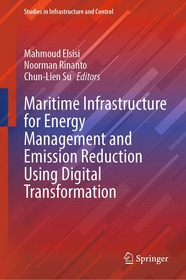
Maritime Infrastructure for Energy Management and Emission Reduction Using Digital Transformation
Series: Studies in Infrastructure and Control;
- Publisher's listprice EUR 181.89
-
75 438 Ft (71 846 Ft + 5% VAT)
The price is estimated because at the time of ordering we do not know what conversion rates will apply to HUF / product currency when the book arrives. In case HUF is weaker, the price increases slightly, in case HUF is stronger, the price goes lower slightly.
- Discount 20% (cc. 15 088 Ft off)
- Discounted price 60 351 Ft (57 477 Ft + 5% VAT)
Subcribe now and take benefit of a favourable price.
Subscribe
75 438 Ft

Availability
printed on demand
Why don't you give exact delivery time?
Delivery time is estimated on our previous experiences. We give estimations only, because we order from outside Hungary, and the delivery time mainly depends on how quickly the publisher supplies the book. Faster or slower deliveries both happen, but we do our best to supply as quickly as possible.
Product details:
- Publisher Springer Nature Singapore
- Date of Publication 4 May 2025
- Number of Volumes 1 pieces, Book
- ISBN 9789819644377
- Binding Hardback
- No. of pages296 pages
- Size 235x155 mm
- Language English
- Illustrations XII, 296 p. 69 illus., 59 illus. in color. Illustrations, black & white 659
Categories
Long description:
This book offers a comprehensive exploration of how digital transformation can revolutionize maritime infrastructure for enhanced energy management and emission reduction. As global industries strive to meet stringent environmental regulations and sustainability goals, the maritime sector faces significant challenges in reducing its carbon footprint and optimizing energy consumption. Through a systematic analysis of digital technologies such as IoT, artificial intelligence, and digital twins, this book delves into practical applications that enable real-time monitoring, predictive maintenance, and efficient energy use across maritime operations. Key topics include the integration of renewable energy sources, cybersecurity considerations in digital maritime systems, and case studies highlighting successful implementations of digital strategies. The regulatory framework governing emissions and energy management in maritime operations is also addressed, alongside future trends and innovations shaping the industry’s sustainable evolution. This book is essential reading for maritime professionals, researchers, policymakers, and academics seeking to understand the transformative potential of digital technologies in addressing environmental challenges and driving operational efficiency within maritime infrastructure.
MoreTable of Contents:
Introduction to Maritime Infrastructure and Digital Transformation.- Challenges in Energy Management and Emission Reduction.- Digital Technologies for Energy Monitoring and Optimization.- Advanced-Data Analytics for Maritime Energy Efficiency.- Digital Twin Applications in Maritime Systems.- Cybersecurity in Digital Maritime Infrastructure.- Integration of Renewable Energy Sources in Maritime Operations.- Case Studies of Successful Energy Management Initiatives.- Regulatory Framework and Policy Implications.- Future Trends and Innovations in Maritime Energy Management.
More





